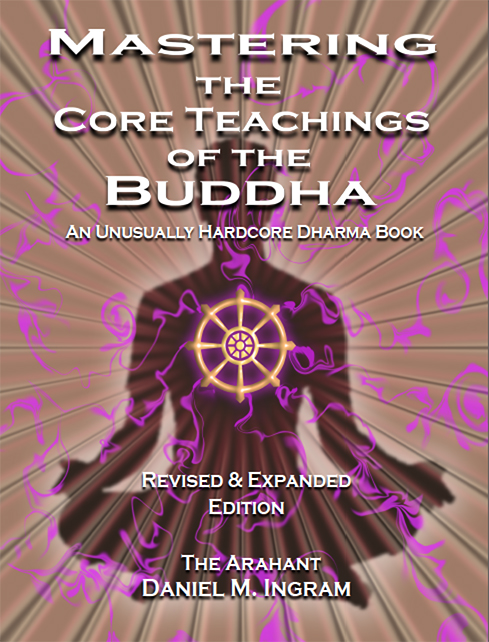Morality and Magick
← Fire Kasina Practice | 70. Around the World and Finding Home →
Shortly thereafter, I sat in the meditation hall at the back of the room, and began using the candle flames on the altar for my object. I wondered if I could replicate what had happened in my room, so I went through the sequence, resolved, and boom, the same type of experience happened again, energy blasting down, across the meditation hall, and up into the flame and it lurched sideways for a few seconds, then straightened up. I doubt anyone would have noticed, but my question is, had they looked up, what would they have seen?
Moving that flame had an effect beyond whether I could actually move a flame with my mind, or intentionally hallucinate to a degree that was so powerful I couldn’t tell the difference. It scared the crap out of me, but it was a fear that would take time to really sink in, like a slow-building fear. The problem was that I had seen in an unusually direct and clear way that mental activity could indeed shape the world. While one might not see this as a problem from a high dharma point of view, I found it frankly scary.
The insight that slowly arose from this was that it didn’t matter if I had moved some real, objective flame, if anyone else could have seen it move, or if I was just able to create for myself the vision that the flame moved. What mattered was that the experience of moving the flame was causal, that there is causal efficacy related to the use of my mind, as there were clearly profound consequences for me having seen the flame move regardless of any other objective standard and, at least for me, there was no difference between hallucination and reality in terms of the bare fact of causality. It turns out that countless things are like that, from our interpretations of the world, to our feelings, to our inner monologue and dreams: all very powerful, all causal, all seemingly “subjective”, all with profound consequences for the “external” “physical” world. Remember, subjective does not mean private or in any way isolated from anything. It is truly worth reiterating: everything is interrelated.
That dawning insight led to the real punchline of the moving candle flame: all “internal” intentions, thoughts, and mental states mattered, were causal, were spell-casting, were powerful, and molded some part of the causal world. Thus, every single moment of “internal” experience must have ethics applied to it, because it matters, as it is an integral part of this whole space of manifestation. This seemingly obvious insight didn’t sink in all at once but took years to develop. I can’t speak for anyone else, but I didn’t have that level of simultaneous fear and sense of opportunity applying to everything I thought, intended, and felt until that insight slowly began to grow in me.
However, after moving the candle flame, I began to think, “Holy shit, every friggin’ thought and feeling is a magickal act, a part of how I shape this world, even if their effects are very subtle, or even imperceptible, as thoughts and feelings come thousands per hour, and their cumulative effect must be something substantial. Wow, have I been a total idiot.”
Thus, it was, ironically, that by playing a juvenile recreational game with the powers, I finally began to get some actual insight into the profundity of the first few lines mentioned already from one of the most commonly read of all Buddhist texts, the Dhammapada, which clearly states in the most unambiguous terms: “All actions are led by the mind. Mind is their master. Mind is their maker. Act or speak with a defiled state of mind, and suffering will follow.” My appreciation for the profound importance of morality training was greatly increased by those experiences of trying to move the candle flame.
Back to somewhat more mundane occurrences, I remember one day on the retreat, I was walking along doing my mantra and I began to hear what sounded like a female evangelical preacher giving a sermon whose content had some pretty inflammatory and paranoid overtones. This went on for about five minutes. Some days later I would recall this and remembered that this had occurred just before noon on Sunday, meaning about the time that such a sermon might take place. This was my one experience with a small episode of what might be termed “divine ear”, or just good old psychotic paranoia. Luckily, it didn’t recur, mostly as it didn’t seem a good direction to go in, so I rapidly turned my attention elsewhere. That experience, plenty of experiences with Re-observation, and many, many reports by other meditating co-adventurers, led to the warnings you find in this book.
The only other thing of note that I remember learning on that retreat was that all those amazing abilities and experiences faded within twenty-four hours when I stopped practicing; all the enhanced concentration abilities just disappeared, and I was left with tantalizing memories and insights into the power of the concentrated mind, but not with the ability to do any of it nearly effortlessly on command as I had during the previous week of mental malleability. That rapid drop is commonly reported, hence the warnings that concentration must be guarded during intensive periods of practice, as it fades rapidly, and even small periods of time without that level of practice will cause most people to fall rapidly out of malleability to much lower levels of access to the abilities they had while on retreat.
← Fire Kasina Practice | 70. Around the World and Finding Home →

